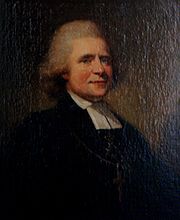
Carl Gustaf Nordin
Encyclopedia

Early life
In 1774 he was made docent of Gothic antiquities at Uppsala UniversityUppsala University
Uppsala University is a research university in Uppsala, Sweden, and is the oldest university in Scandinavia, founded in 1477. It consistently ranks among the best universities in Northern Europe in international rankings and is generally considered one of the most prestigious institutions of...
in consequence of his remarkable treatise, “Monumenta svia-gothica vetustioris aevi falso meritoque suspecta”.
When he was summoned to Stockholm in 1782 by Gustav III of Sweden
Gustav III of Sweden
Gustav III was King of Sweden from 1771 until his death. He was the eldest son of King Adolph Frederick and Queen Louise Ulrica of Sweden, she a sister of Frederick the Great of Prussia....
to edit a Swedish Corpus diplomaticum, half an hour's private conversation with the young priest convinced Gustav that Nordin's proper place was in the political arena. But he employed Nordin quite differently from his episcopal colleague Olof Wallqvist
Olof Wallqvist
Olof Wallqvist , Swedish statesman and ecclesiastic, was ordained in 1776, became Doctor of Philosophy in 1779, court preacher to Queen Louisa Ulrica in 1780, and bishop of Växjö in 1787....
. While the bishop publicly defended the royal measures, Nordin became the king's private adviser. In politics Nordin was a royalist. To him, a parliament seemed little better than a mob. He was one of the king's secret managers during the troublesome and dangerous Riksdag
Riksdag of the Estates
The Riksdag of the Estates , was the name used for the Estates of the Swedish realm when they were assembled. Until its dissolution in 1866, the institution was the highest authority in Sweden next to the King...
of 1789, but advised caution and compared the estate of clergy, which at one time held the balance between the jarring orders, to ice which might be walked upon but could not be driven over.
Nordin was appointed a member of an ecclesiastical commission for reforming the church in 1787, in which capacity he was virtually minister of public worship. In 1791–1792 he became a leading member of the financial and general committees of the Riksdag.
Bishop
After the king's death Nordin shared in the general disgrace of the Gustavians and lived in retirement at the little town of HärnösandHärnösand
Härnösand is a locality and the seat of Härnösand Municipality in Västernorrland County, Sweden with 18,003 inhabitants in 2005. It is called "the gate to the High Coast" because of the world heritage landscape rises just some miles north of Härnösand...
, where he held the post of lector at the gymnasium
Gymnasium (school)
A gymnasium is a type of school providing secondary education in some parts of Europe, comparable to English grammar schools or sixth form colleges and U.S. college preparatory high schools. The word γυμνάσιον was used in Ancient Greece, meaning a locality for both physical and intellectual...
. But he reappeared prominently on the political scene during the Riksdag
Riksdag of the Estates
The Riksdag of the Estates , was the name used for the Estates of the Swedish realm when they were assembled. Until its dissolution in 1866, the institution was the highest authority in Sweden next to the King...
of 1800, and in 1805 was consecrated bishop of Härnösand.
Scholar
Though he lacked the brilliant qualities of his rival Wallqvist, Nordin had the same alertness and penetration, and was more stable and disinterested. One of the most learned men of his day, he devoted his spare time to history, and discovered that many of the oldest and most cherished Scandinavian manuscripts were clever forgeries. Like Jean HardouinJean Hardouin
Jean Hardouin , French classical scholar, was born at Quimper in Brittany.Having acquired a taste for literature in his father's book-shop, he sought and obtained admission into the order of the Jesuits in around 1662...
he got to believe that a great deal of what is called classical literature was compiled by anonymous authors at a much later date, and he used frequently to startle his colleagues, the Gustavian academicians, by his audacious paradoxes.
Nordin left behind him a colossal collection of manuscripts, the so-called Nordinska Samlingarna, which were purchased and presented to Upsala University by Charles XIV of Sweden and form the groundwork of the well-known Scriptores rerum Suecicarum medii aevi.
Nordin published during his lifetime Handlingar till uplysning af svenska krigs-historien (Stockholm, 1787–1788). His academical addresses came out at Stockholm in 1818 under the title Minnen ofver namnkunniga svenska män. His Dagbok or Diary did not appear till 1868.

